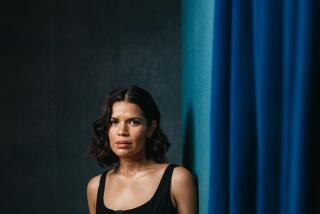Elizabeth Warnock Fernea dies at 81; scholar of Middle Eastern women’s studies
- Share via
Elizabeth Warnock Fernea, a scholar of women’s studies in the Middle East who delved into the subject as a newlywed in 1956 in Iraq and whose memoir about the experience, “Guests of the Sheik,” was the first of several of her works that examined the role of women in the region, has died. She was 81.
Fernea, who was a professor emeritus of comparative literature and Middle Eastern studies at the University of Texas, died Tuesday at a daughter’s home in La Cañada Flintridge after a long illness, her family said.
When she arrived in the remote Iraqi village then known as El Nahra, she was essentially there as the supportive spouse of Robert A. Fernea, a social anthropologist doing doctoral fieldwork. To accommodate his study, she lived as the local women did -- segregated from men and covering her head and body in public in a black robe known as an abayah.
“No Western woman had ever lived in El Nahra before, and very few had ever been seen there,” Elizabeth Fernea wrote in “Guests of the Sheik,” “which meant I would be something of a curiosity.”
Because the couple stayed in the home of a sheik, she spent most of her daily life with the women of their host’s harem, who struggled to accept her American ways. But when she left two years later, she had won over the women and the village with her efforts to learn their language and culture.
In “500 Great Books by Women” (1994), reviewer Rebecca Sullivan wrote, “The story of her life among the Iraqis is eye-opening, written with intellectual honesty as well as love and respect for the seemingly impenetrable society.”
The experience inspired Fernea to devote much of the rest of her life to Middle Eastern studies.
First she moved to Cairo, where her three children were born and her husband taught at the American University. In 1966, they relocated to Austin, Texas, where he eventually became director of the Center for Middle Eastern Studies at the University of Texas.
Elizabeth raised her children and began writing books on a manual typewriter that she used until two years ago.
Other earlier books, such as “A View of the Nile” (1970), were also autobiographical. Later works, written after she joined the University of Texas in 1975 to teach comparative literature and Middle Eastern studies, were more scholarly.
For the book “In Search of Feminism: One Woman’s Global Journey” (1998), she traveled to nine countries over two years to interview Muslim women about feminism. She concluded that there was a strong feminist movement in the Middle East but that it was an “Islamic feminism” that meant women struggled to live in harmony under the laws of Islam.
The book exploded “the myth that feminism can’t take root in lands where Islam rules,” Kirkus Reviews said in 1997.
Among her other, better-known works were “The Arab World: Personal Encounters” (1985), written with her husband; and “Children in the Muslim Middle East” (1995), a collection of essays that she edited.
Annes McCann-Baker, a former editor at the university’s Middle Eastern center, said Fernea had a talent for recognizing promising authors who were unknown in the West.
“She was obviously a really intelligent woman but she was also kind and funny, and she made the Middle Eastern center here at the university a home for many from abroad,” McCann-Baker said.
Fernea went on to produce several documentaries about the Middle East. Her most recent film was “Living With the Past: Historic Cairo” (2001).
She was born Elizabeth Janet Warnock on Oct. 21, 1927, in Milwaukee to David and Elizabeth Warnock. Growing up in the mining town of Flin Flon in Manitoba, Canada, she was called Betty Jane. Her chemical engineer father worked in the mines.
At 14, she moved to Portland, Ore., with her family and earned a bachelor’s degree in English from Reed College in 1949.
In college, she started going by “B.J.” to distinguish herself from the many other Betty Janes of the era, and the nickname stuck.
She did graduate work at Mount Holyoke College in Massachusetts and at the University of Chicago.
In 1999, Fernea retired from teaching at the University of Texas but continued to throw her annual New Year’s Day party, which inevitably featured Middle Eastern dishes mixed in among the traditional holiday sugar cookies.
In addition to her husband, Robert, Fernea is survived by her daughters, Laura Ann and Laila; her son, David; and several grandchildren.
Nelson is a Times staff writer.
More to Read
Start your day right
Sign up for Essential California for the L.A. Times biggest news, features and recommendations in your inbox six days a week.
You may occasionally receive promotional content from the Los Angeles Times.








